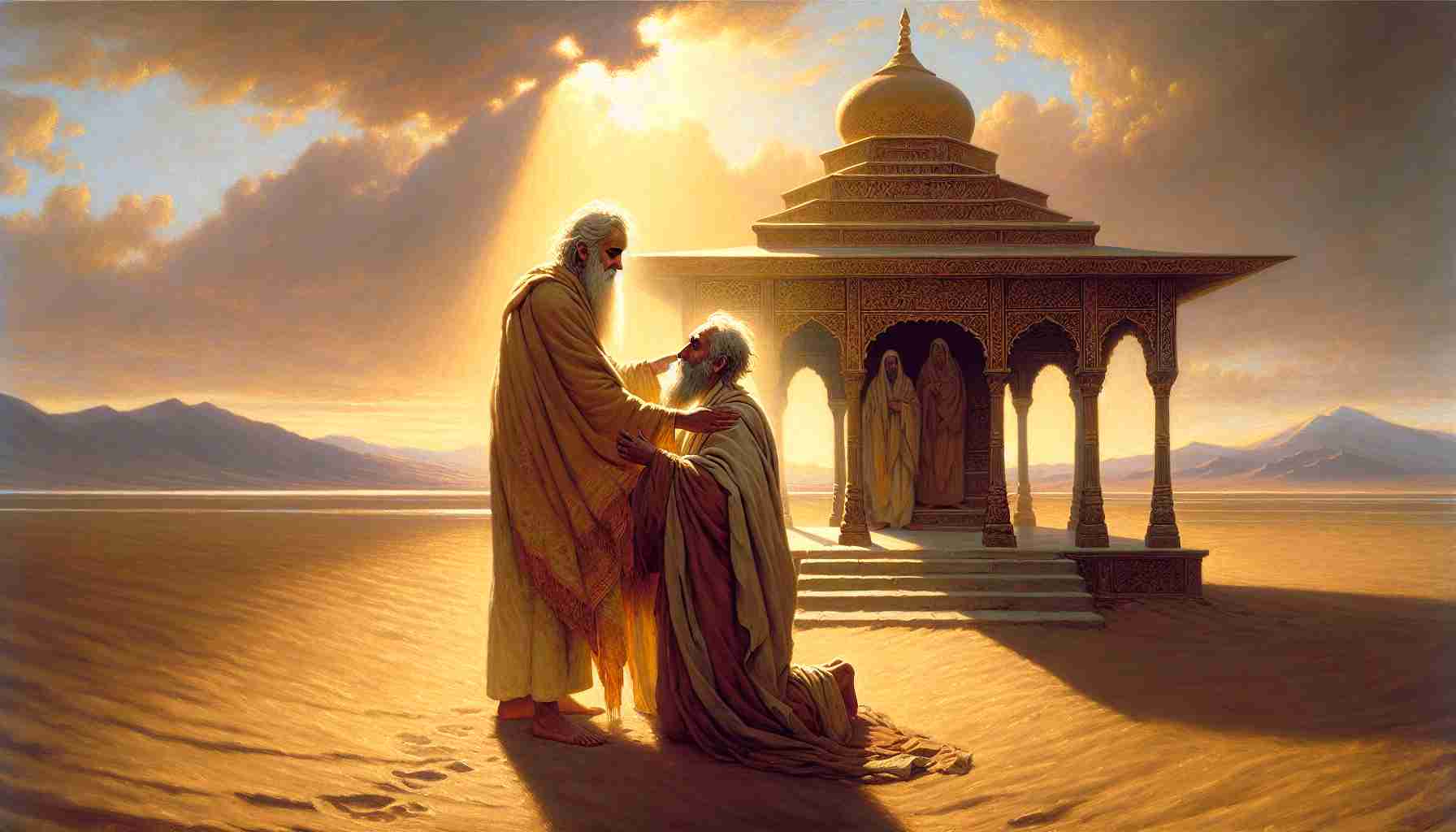

They say the older a man gets, the more he sees his footsteps fade behind him. I was one of the elders of the tribe of Ephraim then—already bent with years, the lines on my face like the folded parchment of the Torah scrolls. But I remember that day with such sharpness, I can still taste the dust curling in the dry air.
It was just before we were to enter the Land—the one our people had wandered forty years to reach. But we all felt the shifting winds. Moses—our leader, our prophet, the voice who stood between us and God—had announced he would not be the one to cross the Jordan. The news struck like a branch snapping in winter.
I stood near the Tent of Meeting when it happened. Joshua, the son of Nun, my nephew, just knelt there with his head bowed low. He had always been faithful, always served Moses like a shadow that followed without complaint. But to lead? To carry the burden Moses had carried? It seemed unthinkable.
Then Moses laid his hands on Joshua’s head.
Not just a gesture—no. It was as though in that moment, something real and powerful passed from one man to the other. We call it “semichah”—laying of hands. But it was more than tradition. I saw it in Moses’s eyes, filled—not with sorrow, but with peace. And in Joshua’s, wide and full of questions, I saw something new flicker: a flame where there had been only a spark.
At first, I wanted to rejoice. But my heart ached.
I remember the first time Joshua swung a sword for our people—as a young man at the battle with Amalek. And now he was to lead us into war again, not just battles with swords, but battles of faith. He wasn’t Moses. He didn’t speak with a booming voice or come down from mountains with laws carved in stone. He was quieter—steady like a river stone.
Still, Moses lifted his voice and said in front of all our people, “Give him your support, as you did me.” And somehow, that made it real.
Later, under the stars, I sat beside Joshua. He said nothing for a long time. Then he whispered, “How could I ever walk where Moses walked?”
I looked at him—no longer my young nephew, but a man chosen. I said, “You are not Moses. You are Joshua. And God chose you for what comes next, not what came before.”
His shoulders eased. Something in him accepted that. The burden became his.
And in that moment, I found peace too.
The desert winds still blew across our tents that night, but for the first time, I believed we would make it. Not because Moses had led us—but because he had prepared someone else to finish the journey.
They say the older a man gets, the more he sees his footsteps fade behind him. I was one of the elders of the tribe of Ephraim then—already bent with years, the lines on my face like the folded parchment of the Torah scrolls. But I remember that day with such sharpness, I can still taste the dust curling in the dry air.
It was just before we were to enter the Land—the one our people had wandered forty years to reach. But we all felt the shifting winds. Moses—our leader, our prophet, the voice who stood between us and God—had announced he would not be the one to cross the Jordan. The news struck like a branch snapping in winter.
I stood near the Tent of Meeting when it happened. Joshua, the son of Nun, my nephew, just knelt there with his head bowed low. He had always been faithful, always served Moses like a shadow that followed without complaint. But to lead? To carry the burden Moses had carried? It seemed unthinkable.
Then Moses laid his hands on Joshua’s head.
Not just a gesture—no. It was as though in that moment, something real and powerful passed from one man to the other. We call it “semichah”—laying of hands. But it was more than tradition. I saw it in Moses’s eyes, filled—not with sorrow, but with peace. And in Joshua’s, wide and full of questions, I saw something new flicker: a flame where there had been only a spark.
At first, I wanted to rejoice. But my heart ached.
I remember the first time Joshua swung a sword for our people—as a young man at the battle with Amalek. And now he was to lead us into war again, not just battles with swords, but battles of faith. He wasn’t Moses. He didn’t speak with a booming voice or come down from mountains with laws carved in stone. He was quieter—steady like a river stone.
Still, Moses lifted his voice and said in front of all our people, “Give him your support, as you did me.” And somehow, that made it real.
Later, under the stars, I sat beside Joshua. He said nothing for a long time. Then he whispered, “How could I ever walk where Moses walked?”
I looked at him—no longer my young nephew, but a man chosen. I said, “You are not Moses. You are Joshua. And God chose you for what comes next, not what came before.”
His shoulders eased. Something in him accepted that. The burden became his.
And in that moment, I found peace too.
The desert winds still blew across our tents that night, but for the first time, I believed we would make it. Not because Moses had led us—but because he had prepared someone else to finish the journey.